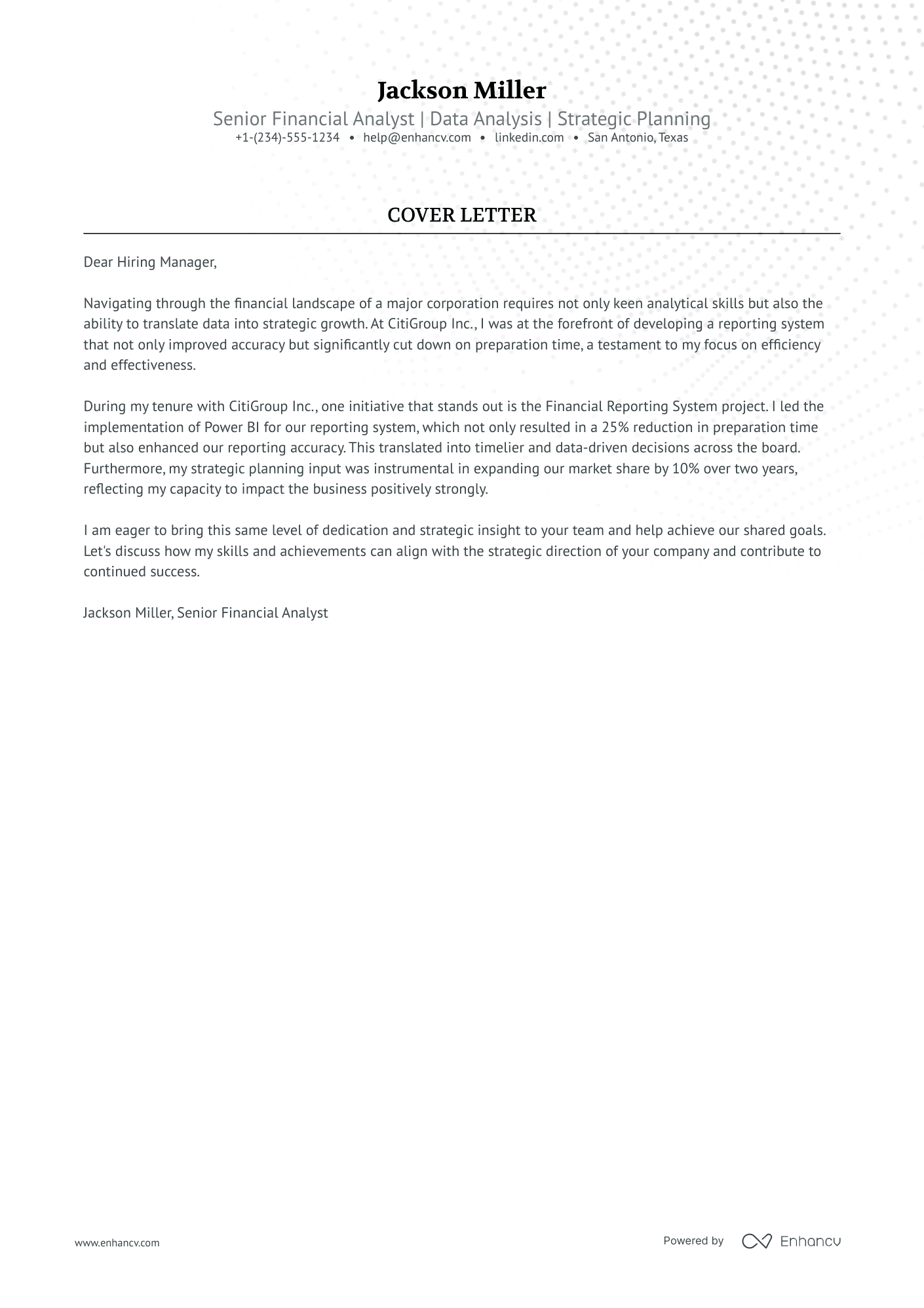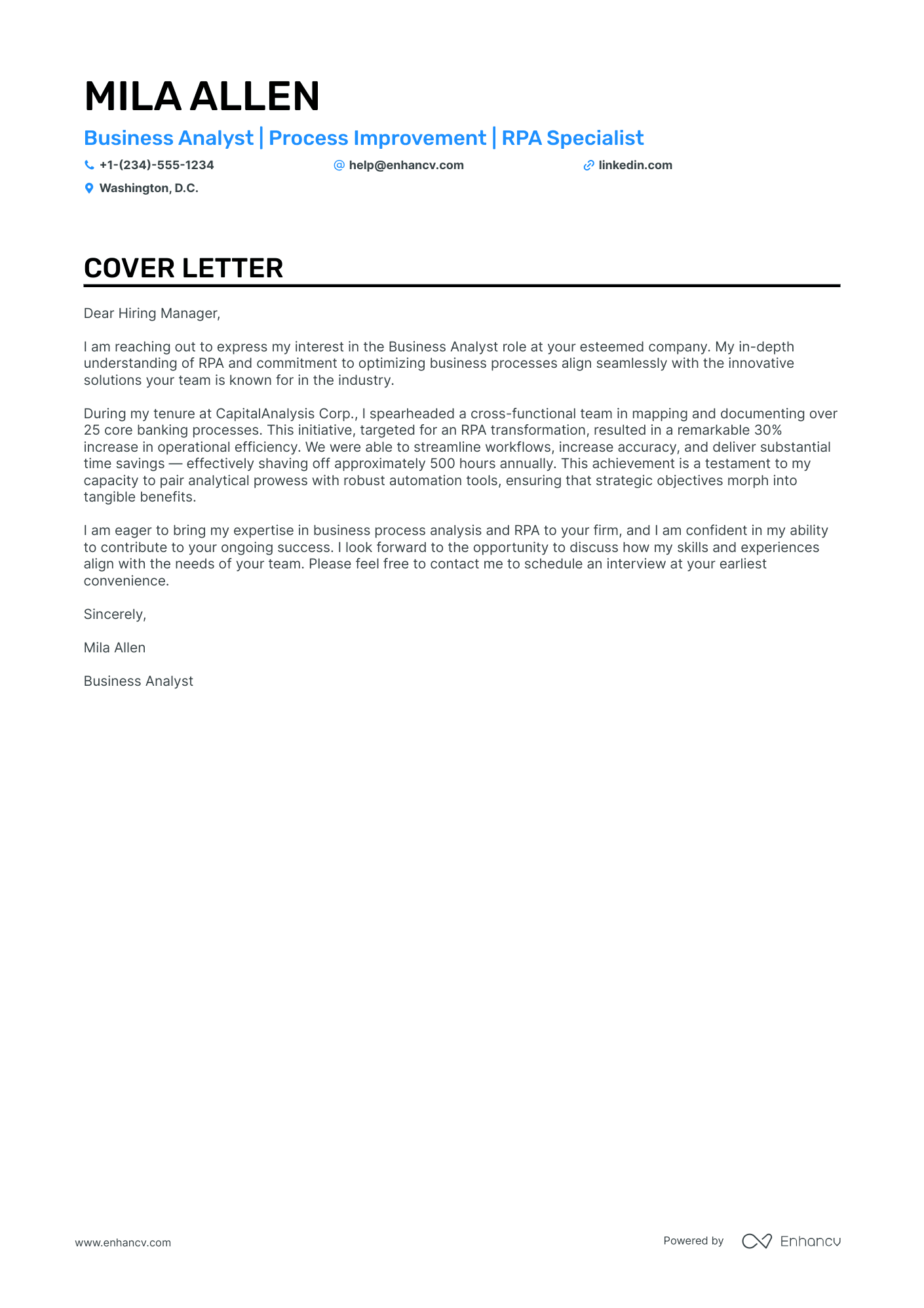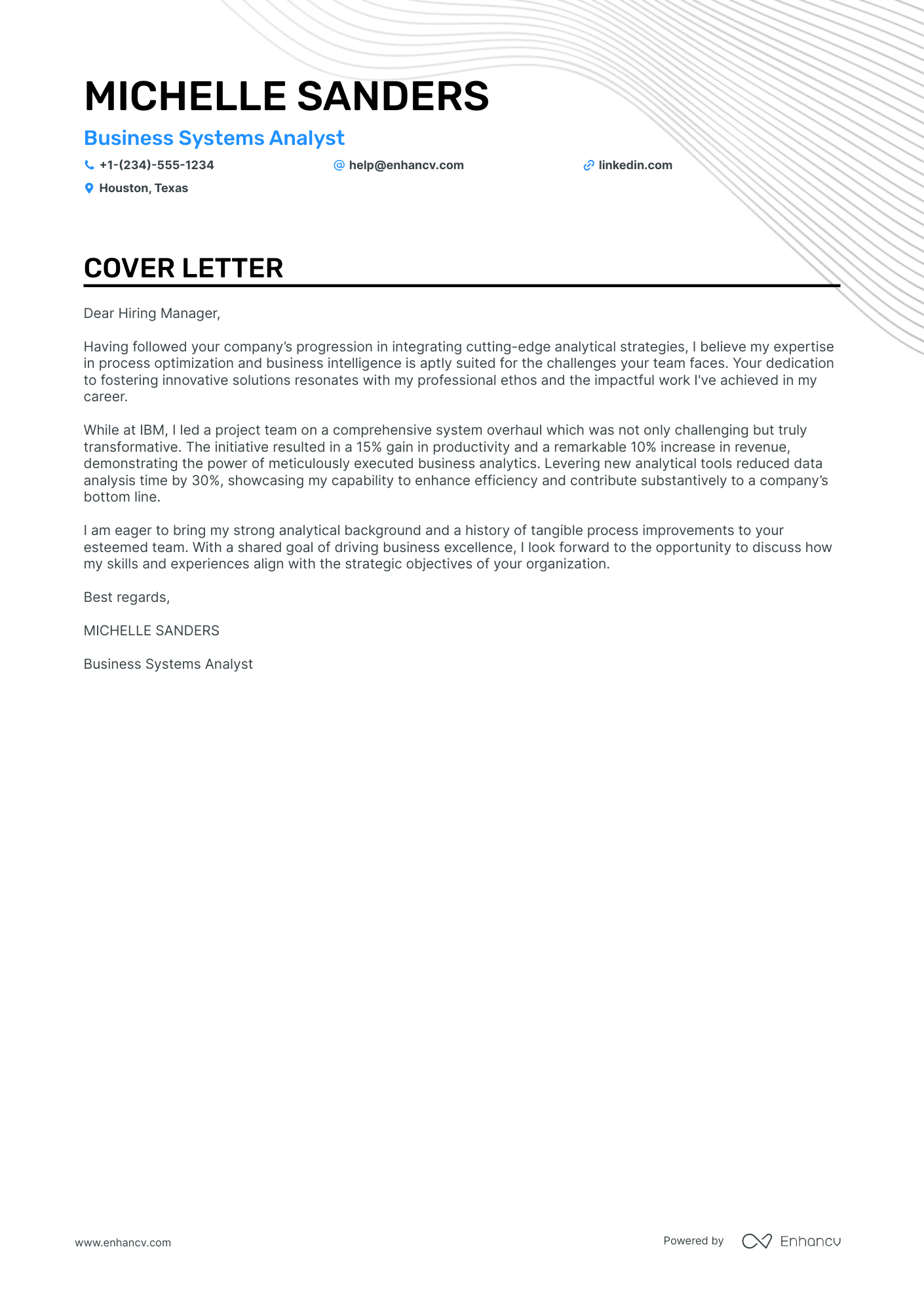Crafting the ideal business analyst cover letter can often feel daunting, especially when you realize it's a pivotal step after starting your job applications. This isn't just a rehash of your resume—it's your chance to spotlight a crowning professional achievement through a compelling narrative. In striking a balance between formality and originality, dodge the clichés and keep it succinct. Your story should unfold on a single page, inviting recruiters into your most outstanding accomplishments. Let's dive in and unlock the formula to make your application stand out.
- Write a business analyst cover letter that helps you stand out (and get the job);
- Understand how to start and end your business analyst cover letter with the appropriate greeting;
- What to include in the body of your business analyst cover letter to put your best foot forward;
- Your most important achievements - how to present them as part of your business analyst cover letter.
And if you want to make your life even easier, simply drag and drop your business analyst resume into Enhancv's AI cover letter generator, and it will write your cover letter for you in just a few moments.
If the business analyst isn't exactly the one you're looking for we have a plethora of cover letter examples for jobs like this one:
Drop your resume here or choose a file.
PDF & DOCX only. Max 2MB file size.
Business analyst cover letter example
ANDREW CLARK
Dallas, TX
+1-(234)-555-1234
help@enhancv.com
- Emphasizing relevant experience: The cover letter highlights specific achievements, such as developing a strategy to manage accounts at risk, which showcase strategic thinking and proficiency in increasing revenue, directly appealing to the needs of a potential employer seeking these skills for their team.
- Aligning with company values: The candidate has clearly researched the company and mentions an alignment with the organization's values, which demonstrates a proactive approach and cultural fit.
- Result-oriented narrative: By mentioning the outcome of past initiatives, such as a 4% revenue increase, the writer reinforces a focus on results, a valuable trait for a role that impacts a company's bottom line.
The format of your business analyst cover letter: structure, fonts, margins, and more
Your business analyst cover letter should include a header (with your name, position, and date); a greeting and introductory paragraph; a body and closing paragraphs; and an optional signature.
Remember that you're writing your business analyst cover letter for recruiters - as the Applicant Tracker System won't scan this content.
Here are a few more tips and tricks to keep in mind when formatting your business analyst cover letter:
- Use the same font in your business analyst cover letter and resume. We recommend modern fonts, e.g. Lato and Rubik, to help you stand out, instead of the stereotypical Arial and Times New Roman.
- Each paragraph should have single spacing, which is already set up for you in our cover letter templates.
- Our cover letter builder follows industry standards for your business analyst cover letter formatting - with a one-inch margin, surrounding your content.
- Always export your business analyst cover letter in PDF to ensure the image or text quality stays the same and your writing isn't moved about.
Writing cover letters just got easier. Use our free cover letter generator to create yours instantly.
The top sections on a business analyst cover letter
- Header with Contact Information: This section should include your name, address, phone number, and email, ensuring that the recruiter can easily reach out to you for potential interviews or further discussions.
- Opening Greeting: Address the recruiter or hiring manager by name if possible, as personalized greetings can help establish an initial rapport and show attention to detail, which is crucial for a business analyst role.
- Introduction: Begin with a concise statement that captures your strong interest in the business analyst position and highlight your most relevant qualification or achievement to immediately draw the recruiter's attention to your key strengths.
- Body of the Cover Letter: Divide this section into two or three paragraphs detailing your experience with analytical tools, problem-solving skills, and how you've successfully used data-driven decision-making in past roles to add value to the businesses, which is essential for a business analyst.
- Closing Paragraph and Call to Action: Conclude with a polite expression of your enthusiasm for the opportunity, and propose the next steps, such as willingness for an interview, which demonstrates proactivity and eagerness to contribute as a business analyst.
Key qualities recruiters search for in a candidate’s cover letter
- Strong analytical skills: Essential for interpreting complex data and converting it into actionable insights for the company.
- Proficiency in business intelligence software: Such as Tableau or Power BI, equips the analyst to create meaningful reports and dashboards.
- Excellent communication and interpersonal abilities: Crucial for translating technical information to non-technical stakeholders and collaborating with different departments.
- Experience in project management: Demonstrates the capability to oversee projects from conception to completion, ensuring that analysis informs business decisions throughout.
- Knowledge of data modeling and requirements analysis: Important for understanding the intricacies of how data can be used to solve business problems and inform strategy.
- An understanding of the specific industry: Shows that the applicant can provide relevant and informed analysis based on industry trends and challenges.
How to start your business analyst cover letter: with a greeting, of course
Have you ever considered just how powerful a personalized salutation can be?
We sure have news for you! Your business analyst cover letter should start with the right salutation to recruiters, nurturing a sense of respect and individuality.
Greet recruiters by using their first name (e.g. "Dear Tom" or "Dear Patricia") if you've previously established contact with them.
Otherwise, opt out for the less familiar, "Dear Ms. Peaches" or "Dear Ms Kelsey", if you've found the recruiter's name on LinkedIn or a corporate website.
"To whom it may concern" is never a good option, as it creates a sense that you've been sending out your business analyst cover letter to anyone. Instead, use "Dear HR team" or "Dear (company name) recruiter" for a feeling of exclusivity.
List of salutations you can use
- Dear Hiring Manager,
- Dear [Specific Department] Team,
- Dear Mr./Ms. [Last Name],
- Good Day [Mr./Ms. Last Name],
- Attention: [Name of Hiring Manager or Relevant Person],
- Esteemed [Job Title or Team],
The business analyst cover letter intro: aligning your interest with the company culture
You only have one chance at making a memorable first impression on recruiters with your business analyst cover letter.
Structure your introduction to be precise and to include no more than two sentences.
Here are some ideas on how to write a job-winning business analyst cover letter introduction:
- get creative - show off your personality from the get-go (if this aligns with the company culture);
- focus on your motivation - be specific when you say what gets you excited about this opportunity.
That one achievement in your business analyst cover letter body
The lengthiest part of your business analyst cover letter is the body.
Within the next three to six middle paragraphs, present yourself as the best candidate for the role.
How can you do that without retelling your whole professional resume?
Select one key achievement that covers job-crucial skills and technologies (and is memorable).
Within the body of your business analyst cover letter, aim to tell the story of how you achieved your success. Also, write about how this would help out your potential team.
Ending your business analyst cover letter to avoid "sincerely yours"
Yes, this sort of closing statement may work best before your signature.
But you want to give recruiters something more with your business analyst cover letter ending.
Some professionals choose to go down the path of promises. In a single sentence, they map out what they'd bring about to the role (whether that's a particular technical skill set or personal traits).
Others, decide to be more concrete by thanking recruiters for their time and prompting for their next interview.
Whatever path you choose, remember to always be polite and respectful of the opportunity you've had. Good manners go a long way.
What to write on your business analyst cover letter, when you have zero experience
The best advice for candidates, writing their business analyst cover letters with no experience, is this - be honest.
If you have no past professional roles in your portfolio, focus recruiters' attention on your strengths - like your unique, transferrable skill set (gained as a result of your whole life), backed up by one key achievement.
Or, maybe you dream big and have huge motivation to join the company. Use your business analyst cover letter to describe your career ambition - that one that keeps you up at night, dreaming about your future.
Finally, always ensure you've answered why employers should hire precisely you and how your skills would benefit their organization.
Key takeaways
Writing your business analyst cover letter has never been easier, so remember to:
- Select a business analyst cover letter template that automatically meets industry formatting (e.g. has one-inch margins, is single-spaced, is in PDF, etc.);
- Make your business analyst cover letter personal by mentioning the recruiters' first or last name;
- Within the introduction, describe what you like best about the company in no more than two sentences;
- Use your business analyst cover letter body to tell a story of your greatest achievement, backed up by job-relevant skills and technologies;
- If you have no professional experience, be honest about it in your business analyst cover letter, but also write about your unique talents.
Business Analyst cover letter examples
By Role








